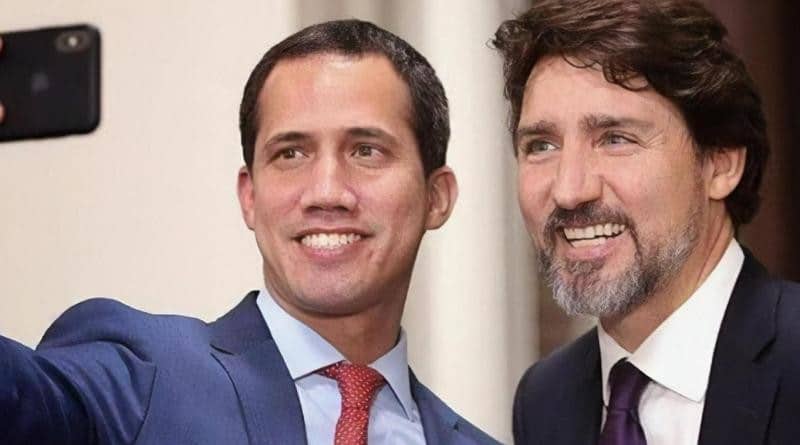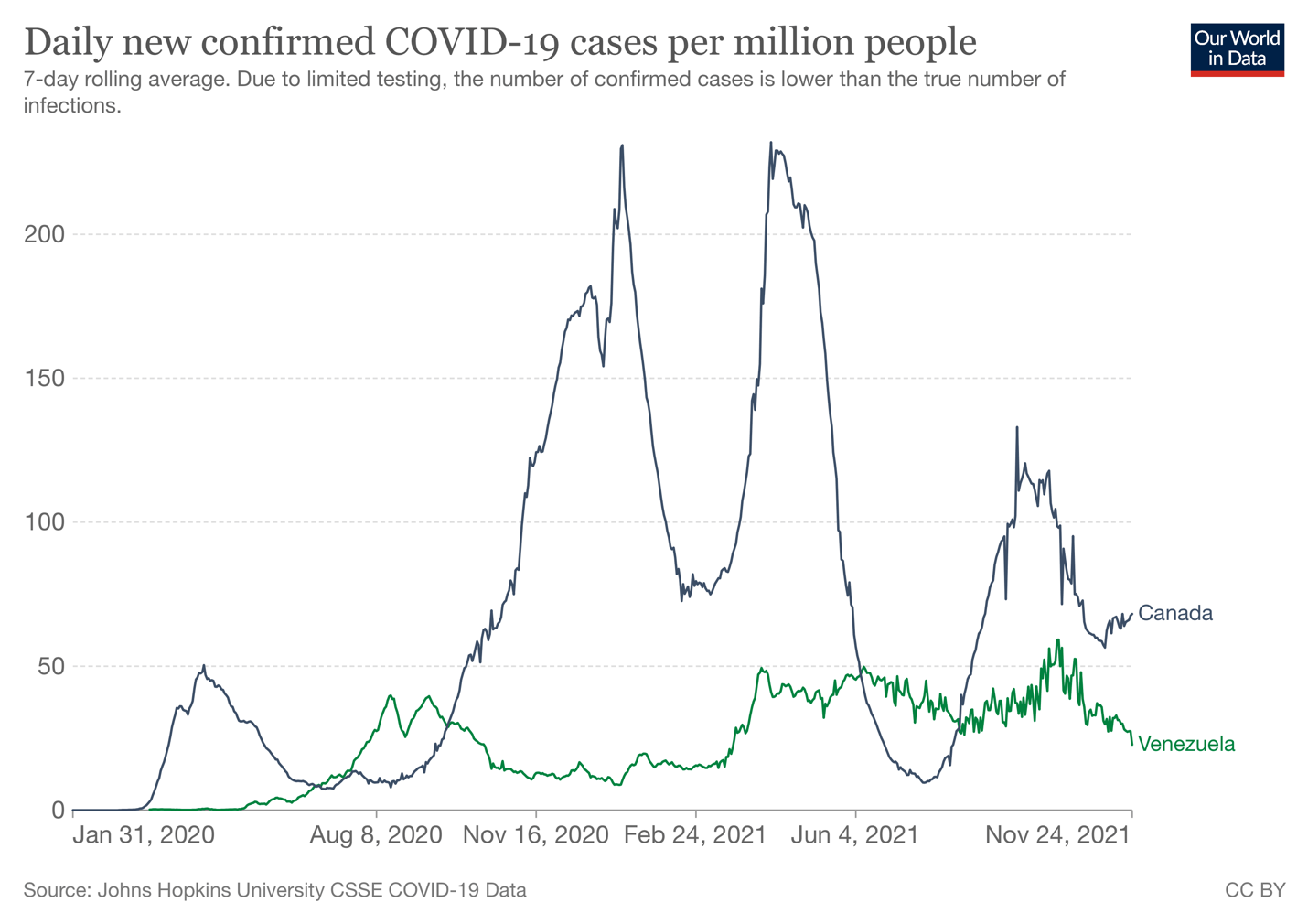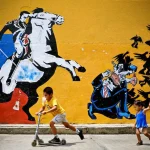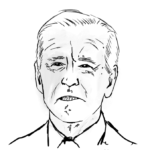
By María Páez Victor – Dec 3, 2021
Canada is proving to be a very bad neighbor indeed to Venezuela, and, also in the process, to all of Latin America. Because of Ottawa’s staunch adherence to USA foreign policy it is largely viewed in the region not as a “partner” of the USA, more like its servant or lackey.
There is no greater indication of how Canada is regarded internationally than its failure -twice- to get a seat at the UN Security Council. A vote for Canada was considered a vote for Uncle Sam. The reaction of the Canadian government to the elections in Venezuela on 21st of November 2021 have sealed this perception of Canada.
The Canadian administrations of recent years – both Conservative and Liberal – have done a great disservice to the good people of Canada who are to a very large extent kept in ignorance of what its government does abroad. The Ministry of Foreign Affairs acts like a fiefdom with little or no oversight except from Washington. It is very sad to see Canada position itself on the wrong side of history. To see it:
• linked to the “regime change” neo-colonialist machinations of the USA that wants to control and privatize Venezuelan oil and gold mines and disembowel a nation that dares to go its own way instead of obeying the USA’s dictats.
• besmirching its past tradition of support for the United Nations
• placing itself at the risk of being hauled up before the International Criminal Court for crimes against humanity for sanctioning Venezuelans and their government
• lacking humanitarian concern in not helping other countries, and specifically Venezuela, to obtain vaccines during a horrendous global pandemic.
Let me explain. Canadian political leaders talk about respect for the “rule of law” (which they selectively define), but they do not, however, respect international rule of law because the sanctions imposed by Canada against Venezuela are illegal and a crime against humanity as the UN has declared. What applies at home, is found wanting when it comes to respect for the United Nations Charter, the Organization of American States Charter, the International Criminal Court Rome Statute, all transgressed by these Canadian sanctions.
The USA hybrid war against the Venezuelan Bolivarian government and President Nicolás Maduro includes the economic blockade, coup d’etat attempts, cyber-attacks, infrastructure sabotage, assassination attempts, a fake “humanitarian” invasion, paramilitary invasions by mercenaries, misappropriation of Venezuelan assets, currency manipulation, financing violent urban gangs, and a vile media campaign of defamation. Not one word of condemnation for these assaults has been issued by Ottawa. During the pandemic the USA has used disease as a weapon by pressuring the UN COVAX program whose sole mission is to give access to vaccines to low- and middle-income countries, not to not allow vaccines to reach Venezuela, which thankfully failed.[1] Canada in no instance urged vaccines to be delivered to Venezuela.
There are shades of colonialism in the USA and Canada’s condemnation of Hugo Chávez and now Nicolás Maduro. By what authority or rationale do they sanction Venezuela? Where is the evidence of guilt of President Maduro who is maligned as a dictator? How exactly is Venezuela not a democracy? Canada is simply following the regime-change foreign policy of the USA. And not a small part of it has to do with the Canadian mining lobby that is very much welcomed in Ottawa’s corridors of power, and wants to take hold of Venezuela’s abundant resources, particularly its gold mines.
In November 2021, Venezuela held peaceful and orderly “mega-elections” for regional, mayoralty and municipal representatives, witnessed by more than 300 international observers from 55 countries and from the United Nations, the European Union, the Carter Centre, and the Council of Electoral Experts of Latin America. Over 3,000 positions including state legislators, state governors, mayors, and municipal councilors were up for election. Surprisingly, 95.6% of the 70,000 plus candidates were from 37 opposition parties, including many who had boycotted previous elections. Members of opposition parties also served as witnesses and on the Electoral Authority (CNE). The observers lauded the technological efficiency and the biosecurity measures against the pandemic, and while they noted some minor glitches that are common in elections everywhere, they congratulated the people of Venezuela for this exercise in democracy.
RELATED CONTENT: 21N Elections: Venezuela Rejects Canada’s Interference
This participation of the opposition was a direct result of the recent peace negotiations between the Bolivarian Venezuelan government and opposition parties held in México. If there was any doubt about the Tweedledum/Tweedledee relationship between USA and Canadian foreign policy, it is telling that a statement of apparent approval of these negotiations was issued JOINTLY by both countries[2] but this however, did not stop the USA from trying very hard to sabotage those same negotiations.[3]
Five hours after polls closed, with 90% of the votes counted, results were announced. (It took the USA three weeks before Biden was officially declared the winner). The results were universally accepted with no social unrest. The government coalition won 20 of the 23 governorships and opposition parties won governorships in 3 states.[4] The government coalition won 205 mayoralties and the opposition won 59. The voter turnout was 42% which the observers noted is considered high for regional elections.
Indigenous people are included in an exemplary manner in elections. Weeks prior to the elections indigenous ethnic groups held general assemblies to choose candidates by means of their own traditional ways and then held elections for 8 state legislators and 69 municipal councilors in seven states across the country to represent them.
The November 2021 elections were the 29th in 22 years of Bolivarian governments headed first by of Hugo Chávez and now by Nicolás Maduro. Despite this, Western nations, who pride themselves as being the bastions of democracy, nevertheless followed the misbegotten hybrid war of the USA against Venezuela and chose to ignore or malign all these previous elections on spurious grounds, displaying either their ignorance of the country, political hypocrisy or just fawning before an imperial USA, or all of the above.
This malicious attitude toward Venezuela reached its height in 2019 when the USA, Canada and European allies backed an obscure deputy backbencher who proclaimed himself president of the country – the hitherto unknown Juan Guaidó (unknown inside and outside the country); they accepted this absurdity although Guaidó had been elected president by no one. No election necessary there!
It would have been laughable if it were not that the USA handed to Guaidó control over $116 billions in funds and assets that Venezuela held in the USA, including its oil company CITGO.[5] Funds and assets which he proceeded to personally appropriate and squander among his buddies. Even USAID said it has no idea where at least $260 million has gone; 98% of the supposed “humanitarian” aid channeled through Guaidó was used for other unknown purposes.[6] This corruption is one of the fundamental reasons for the disrepute of the opposition parties most of whom at one time had backed Guaido thinking he could not lose with USA backing. How wrong they were!
But there is no mistaking in that the economic war has been brutal. The losses between 2016 and 2019 imposed on Venezuela total $194 billion. The USA and its allies have appropriated $25 billion and about $5.4 billion have been stolen by 50 international banks, including 31 tons of gold that the Bank of England refuses to return to Venezuela. With these billions the country could have paid off its entire foreign debt or have enough to import food and medicine for 45 years. It is equivalent to 25 times what was invested in the Marshall Plan to rebuild Europe after the II World War. As one of Venezuela’s top economist states this is “nothing more than a barefaced daylight robbery and act of piracy.” [7]
The consequences of this hybrid war are more than material. According to the UN Human Rights Rapporteur Alfred de Zayas, tragically, 100,000 Venezuelans died for lack of medicines directly due to the illegal sanctions and the pirating of its resources.[8]
The Canadian government has not once decried these deaths, sanctions or robberies; and indeed, it has pressed for more with its brainchild, the Group of Lima, whose sole objective was to overthrow the Venezuelan government. As the leader of the Lima Group, Canada allied itself to some of the most corrupt, most anti-democratic, most violence-riddled nations in the region in an attempt to discredit and overthrow the legitimate government of Venezuela. This group is now unlamentably dead with the resignation of Peru, Argentina, Mexico, Bolivia and St. Lucia. The new Peruvian Minister of Foreign Affairs famously stated that Peru’s association with the Group of Lima was “the most disastrous thing we have done in international politics in the history of Peru.”[9]
So even after Venezuela carried out a transparent, internationally observed mega-election, with a remarkable amount of opposition participation, USA Secretary of State Anthony Blinken nevertheless decreed that the contest was “flawed” and claimed it did not “reflect the will of the Venezuelan people.” But this USA stubbornness in face of reality was no surprise, as it is the hallmark of its administrations. The USA had no witnesses to the elections. Even before they took place, a spokesperson was denouncing the Venezuelan elections and afterward refused to admit they were legitimate, fair, and democratic.[10]
Canadian reaction to these elections were also quick and followed in lockstep that of the USA. The Canadian government, in its groveling foreign policy labyrinth, issued a bizarre declaration on the recent Venezuelan elections:
“As was in the case in 2018, conditions for free and fair elections still do not exist in Venezuela. The Maduro regime continues to imprison and persecute political opponents, perceived opponents and members of civil society, and there is a suppression of media freedom and an absence of rule of law.”[11]
No Canadian representatives were there on the ground witnessing the elections. No evidence whatsoever was presented about prisoners or suppression of freedoms, no mention of these were made by any actual electoral observers. Obviously, Ottawa based its view on Washington’s, the real source of Canadian foreign policy.
The Venezuelan reaction to the Canadian government’s comments raises some very serious issues in their statement that Canadians should seriously ponder and act upon:
“It is lamentable that, in view of the absence of its own foreign policy and to comply with the expectations of the United States, the government of Canada resorts to disqualifying an electoral process amply validated by more than 300 international observers, and has issued not a declaration of a sovereign state, but a political pamphlet…
Ironically, Canada questions the context of the recent elections, but it was the only country that took concrete actions to deny Venezuelan voters resident in Canadian territory to vote in the Venezuelan Embassy and consulates in 2018….In contrast to Canada, Venezuela is a country free of foreign tutelage and shows it in every election in which it deepens the model of participatory democracy consecrated in the Constitution and backed by the democratic will of the people.” [12]
Contrast the Canadian view to the actual observation of the electoral process carried out by the European Union, no friend of President Maduro. Since 2006 the European Union had refused invitations to observe elections in Venezuela. This time it sent an observation team of 136 people. Their full report is expected in January, but its head, Isabel Santos has already declared that the electoral process was “good or very good”. She praised the Electoral Authority (CNE) as “the most balanced that Venezuela has had”, noted several issues where it believed the process should be improved but overall, observed the technological advances, the process of dialogue between the two Venezuelan political factors and that “the elections were a first and crucial test for the return of the majority of the opposition parties in Venezuela.” [13]
For Venezuelans, the most significant feature of these elections was that the government party and its coalition clearly won. In other democracies, just one iota of the woes that have been visited upon the country by the US/Canada/EU economic war would have brought down the government. Why did people support the governing party when the economy has suffered so much? And what lessons are there for Canada?
Partido Socialista Unido de Venezuela (PSUV) is highly organized and works very closely with a wide variety of social groups. This is in stark contrast to the fractured opposition which, at this crucial moment, showed itself more divided than ever, unable to agree on single candidates thus splitting the opposition vote. But apart from a superior electoral strategy, the people voted for a party that had delivered to them as much as it could during a time of war – because they rightly see their economic suffering caused by foreign powers. They rallied again around a governing party which has invested every available penny in maintaining the anti-poverty programs that has distinguished it; notably, food security, comprehensive public health system, free education, and housing. These are part of the social determinants of health that underlie the quality of a population’s living conditions.
• Working together the Bolivarian national, state, and local governments have:
• Supplied bi-monthly, to 6 million households (24 million people) food boxes containing home-grown products;
• Replaced 90% of the food previously imported with home grown food;
• Established a network of public pharmacies that sell medicines with a 34-40% discount;
• Quite astonishingly, built in the last 6 years 3.5 million housing units – built 500,000 in 2021 alone;
• Increased domestic non-oil production (non-oil) to 9% higher than any time in the last 30 years;
• Improved the economic situation as inflation is down to single digits for the first time in 4 years, the unemployment rate is reduced to 6.6%, the lowest in 30 years, and Credit Suisse project 5.5% growth for next year.[14]
• Issued more than 1,000 radio and TV licences, of which 75% are private, 28% for communities and only 5% are state owned;
• Imprisoned no one who has not had a fair trial according to Venezuelan laws
Above all, leadership of the national government has shone during the pandemic. Those that thought Covid-19 would demolish the nation could not have been more wrong – it has come out stronger than ever, politically, and socially. Venezuela has launched one of Latin America’s most effective responses to the COVID-19 pandemic, with one of the lowest incidences of cases and deaths in all the region. The reasons for this success lie in a combination of responsive leadership, excellent welfare infrastructure built up through 22 years, strong public health measures, social cohesion and international solidarity. Venezuela has coped with the pandemic better than the neighboring countries that follow a market-centred economy, as it flattened the curve in cases and deaths:
Venezuela has even done better than Canada with far less resources at its disposal including access to vaccines; it has avoided very high peaks in infection rates and deaths. During the pandemic, Venezuela has had a cohesive government response that has centralized the campaign against the virus, following the best advice of its medical and epidemiological experts. It has promoted the cooperation with all the jurisdictions. It has obtained the cooperation of private clinics with public hospitals; all Covid-19 medicines are free to the patient whether in a private or public hospital. And the public health campaign has been joined by the voluntary work of countless grassroots organizations.


Venezuela implemented a 7×7 system of lockdown – seven days of total lockdown followed by 7 days of lesser restrictions – all the while maintaining social distancing and masks. International visitors are all tested, and quarantined. There is follow up and tracing of all Covid patients.
This is just one example where Canada and Venezuela could have worked together to their mutual advantage as good neighbours, and there are many others. Historically, both countries became economically over-dependent on the USA, relying too much on the supply of oil and other natural resources to US markets with the heavy-handed involvement of US corporations. Venezuela led by President Chávez and now President Maduro has worked hard to reduce this dependency making Venezuela more self-reliant. Canada could learn much from this experience. It could also learn from how Venezuelan indigenous peoples govern themselves and participate in elections. Venezuela’s world-leading music program El Sistema which has been adopted in many countries could make an incredible contribution to musical education and performance in Canada, especially for children from disadvantaged families, if only Canada could have the sense to learn from Venezuela.
It is past time for Canada to rethink and rebuild its broken relationship with its closest South American neighbour and to become a good neighbour that Canadians can be proud of. But to do that Canada must first secure an independent media not wedded to USA news agencies and, also it would need to elect politicians that will truly stand on guard for the country’s sovereignty.
Notes
1.- Paul Dobson, “Outrage as COVAX Reports Blocked Vaccine Payments, US Sanctions Blamed”, 14 June 2021, Venezuelanaysis, https://venezuelanalysis.com/print/15231 ↑
2.- https://www.canada.ca/en/global-affairs/news/2021/08/venezuelajoint-statement-by-the-eu-high-representativefor-foreign-affairs-and-security-policy-thesecretaryof-state-of-the-united-states-of-america-.html ↑
3.- “Maduro se retira de las negociaciones con la oposición tras la extradicción de Saab a EEUU”, El Periódico, Buenos Aires, 17 octubre 2021, https://www.elperiodico.com/es/internacional/20211017/gobierno-maduro-retira-negociaciones-mexico-12277157 ↑
4.- https://orinocotribune.com/barinas-state-psuv-governor-argenis-chavez-resigns/ ↑
5.- “A $116 mil millones de dólares asciende el robo de activos al Estado venezolano por Guaido”, http://www.cubadebate.cu/noticias/2020/02/16/venezuela-a-116-000-millones-de-dolares-asciende-el-robo-de-activos-al-estado-por-guaido/https://actualidad.rt.com/actualidad/343184-rodriguez-robo-activos-venezolano-estado-guaido-116000-millones
6.- https://www.hinterlaces.net/asalto-a-un-pais-el-prontuario-de-guaido-en-diez-casos-emblematicos/ ↑
7.- “Humanitarian Aid for Venezuela was Used Fraudulently: USAID”, TELESUR, 16 July 2021, https://www.telesurenglish.net/news/Humanitarian-Aid-for-Venezuela-Was-Used-Fraudulently-USAID-20210716-0006.html ↑
8.- Pascualina Curcio, “the Impact of the Economic war on Venezuela”, Ultimas Noticias, 6 July 2020, https://www.caribbeannewsglobal.com/the-impact-of-the-economic-war-on-venezuela/ ↑
“Alfred De Zayas , Former UN Special Rapporteur to Venezuela”, Fernando Arce, 3 Feb. 2019, https://www.mediacoop.ca/story/interview-former-un-special-rapporteur-venezuela-a/36823“Former UN Rapporteur on Human rights: US Sanctions Have Killed More than 100 thousand Venezuelans, Orinoco Tribune, 4 March 2020, https://www.blackagendareport.com/former-un-rapporteur-human-rights-us-sanctions-have-killed-more-100-thousand-venezuelans ↑
9.- Yves Engler, ”The Group of Lima is Falling Apart”, https://canadiandimension.com/articles/view/the-lima-group-is-falling-apart ↑
10.- Luis Granados Ceja, “Venezuela Rejects US and Canadian Efforts to Discredit Elections”, Venezuelanalysis, www.venezeulanalysis.com/news/15390 ↑
11.- https://today.in-24.com/News/628619.html ↑
12.- 21N Elections: Venezuela Rejects Canada’s Interference,
https://orinocotribune.com/21n-elections-venezuela-rejects-canadas-interference/ ↑
13.- “EU Observation Mission: Venezuela’s Electoral Process was “Good or Very Good”, Orinoco Tribune, 24 November 2021, https://orinocotribune.com/eu-observation-mission-venezuelas-electoral-process-was-good-or-very-good/ ↑
14.- Leonardo Flores, “Five reasons the Left won in Venezuela”, 22 Nov. 2021, Orinoco Tribune, http://orinocotribune.com/five-reasons-the-left-won-in-venezuela ↑
Featured image: US puppet Juan Guaidó takes selfie with Canadian Prime Minister Justin Trudeau in January 2020. (File photo)

Maria Paez Victor
María Páez Victor, Ph.D. is a Venezuelan born sociologist living in Canada.
- July 21, 2024
- April 24, 2024




